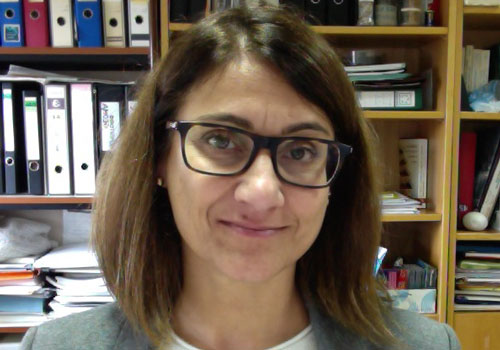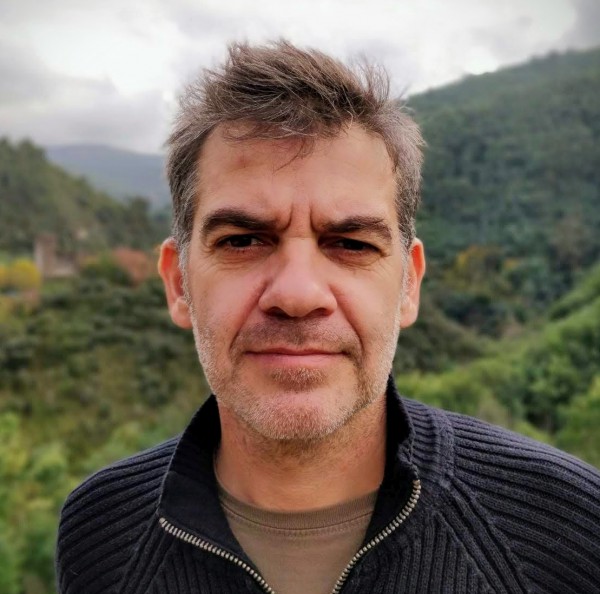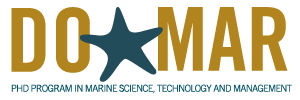
Organization

Dra. Ana Bernabeu Tello
Professor of Stratigraphy
University of Vigo

Dr. Joao Serôdio
Professor
University of Aveiro
Academic Commission
The composition of the Commission is subject to possible variations by decision of the participating institutions (coverage of places currently vacant or substitutions for different reasons).
Composition
University of Vigo
- Ana Bernabeu Tello, Presidenta DOMAR-Galicia
- Asunción Longo González
- Mª Teresa de Castro Rodríguez
- Paloma Morán Martínez
- Jose Luis Soengas Fernández
- Verónica Santalla del Río
- Cristina Sobrino García
University of Santiago de Compostela
- Mª Luz Pérez-Parallé
- Carlos Pereira Dopazo
University of Coruña
- Nuria Fernández Rodríguez
- Vicente Díaz Casás
- Enrique Peña González
- F. Javier Sanz Larruga
- Anxo Ramón Calvo Silvosa
University of Aveiro
- Henrique Queiroga Presidente DOMAR-Portugal
- João Dias
- Clara Rodrigues
University of Minho
- Pedro Gomes
- Cláudia Pascoal
University of Tras os Montes and Alto Douro
- Edna C. Janeiro Cabecinha
- Rui M. Vitor Cortés
- Sandra Mariza Veiga Monteiro
University of Porto
- Natividade Vieira
- Antonio Afonso
Marine Research Institute, Spanish National Research Council
- José Pintado Valverde
National Center Spanish Institute of Oceanography (IEO-CSIC)
- Victoria Besada Montenegro
Functions
Doctoral Committee’s definition and functions (according to the doctoral study regulations by the Universidade de Vigo, pursuant to the Royal Decree 99/2011).
- Definition
The Doctoral Committee (CAPD) is the body responsible for the design, implementation, update, organization, quality, and coordination of this programme.
The CAPD will be formed by a minimum of seven members, amongst whom there will be the chair and secretary. Moreover, it will include at least one member from each university and research entity that take part on the programme.
The CAPD will be made up of doctoral professors with a permanent link to the university and full-time dedication, who possess at least one period of research activity recognised in accordance with Royal Decree 1086/1989, or comparable credits.
- Specific roles
- Designing, organising, coordinating, and suggesting to the doctoral school the activities that are part of the programme, including lines of research, training activities, leaves and incorporations of research staff who will mentor and direct doctoral theses, student body’s admission and selection criteria and every other information that is required to comply with current regulations.
- Reviewing and updating information regarding the doctoral programme and informing EIDO (International Doctoral School) about it within the deadlines and procedures set.
- Conducting the process of merit assessment and admission of students to the doctoral programme, by applying the selection criteria and procedures established in the verification report, which will be made public.
- Assigning students admitted to the programme a mentor and, within a maximum of three months after enrolment, a supervisor, confirming and communicating the authorised profile responsible for supervision in the academic management digital application. The CAPD is also responsible for modifying these appointments and, if applicable, for authorising the co-direction of the thesis when there are academic reasons that justify it.
- Establishing, if applicable, the specific training complements that the students must take to be admitted into the doctoral programme.
- Establishing, if needed, the cross-disciplinary education requirements and specific training in the field of the programme that students must complete after being admitted into the doctoral programme.
- Temporary schedule and yearly supervision of the activities document and research plan of each student, considering the reports elaborated by the authorised profile for this purpose. Moreover, the CAPD shall also approve the recognition of training activities and inform mentors, heads, and PhD students of the results of the evaluation.
- Authorising stays and activities outside Spain in higher education institutions or prestigious research centres, including those necessary to be internationally mentioned and of joint supervision of the doctoral degree. These stays and activities will be informed and evaluated by the head and mentor beforehand. They will also authorise external PhD students stays. In addition, the academic agreement with the host or home institution will be formalised.
- Evaluating the compulsory record to attest the link between theses with an industrial mention and industrial research or an experimental development project conducted in a company or in a public entity.
- Authorising the completion of doctoral studies part-time in the programme when necessary.
- Authorising, if applicable, doctoral studies extensions and granting temporary leaves, according to the Royal Decree 99/2011 and the articles 26 and 27 of this regulation. The CAPD will also develop proposals of permanent teaching leave regarding the doctoral professors and will inform the doctoral candidates and the authorised profile.
- Developing approaches of modification and/or cessation/termination from the programme, which will be sent to the doctoral school for its evaluation.
- Providing the doctoral students and thesis supervisors with academic and/or scientific counselling.
- Identifying care and guidance needs of the doctoral professors, convey them to the doctoral school’s head and carry out specific welcome and guidance activities, if needed.
- Suggesting acknowledgements for directing, coordinating, and managing theses according to the Universidade de Vigo’s regulation.
- Issuing the authorisation report of the beginning of the procedure to submit and publicly defend the doctoral thesis and approve, if it is the case, the quality requirements of doctoral theses.
- Developing and approving the proposal for the composition of the doctoral thesis tribunal.
- Drafting the memory to verify and/or modify the doctoral programme according to the regulations in force.
- Any other task entrusted to them by the Doctoral School or assigned to them in compliance with these regulations and other legal provisions in place.
Ejecutive Commission
The composition of the Executive Commission (delegate of the Academic Commission) is subject to eventual variations by decision of the participating institutions (coverage of places currently vacant or substitutions for different reasons).
Composition
University of Vigo
- Ana Bernabeu Tello, Presidenta DOMAR-Galicia
- Cristina Sobrino García
University of Santiago de Compostela
- Mª Luz Pérez-Parallé
University of Coruña
- Nuria Fernández Rodríguez
University of Aveiro
- Henrique Queiroga Presidente DOMAR-Portugal
University of Minho
- Pedro Gomes
University of Tras os Montes and Alto Douro
- Edna C. Janeiro Cabecinha
University of Porto
- Natividade Vieira
Marine Research Institute, Spanish National Research Council
- José Pintado Valverde
National Center Spanish Institute of Oceanography (IEO-CSIC)
- Victoria Besada Montenegro
Functions
Due to operation motives, the Academic Commission has delegated a range of functions to an Executive Commission, reporting at least once a year to the Academic Commission.
- Authorize the completion of part-time studies and the extension of the terms of deposit of the doctoral theses. Authorize the temporary leaves of doctoral students in the Program.
- Assign a doctoral thesis director to each doctoral student (who will be the same as the tutor envisaged in article 11.3 of Spanish Royal Decree 99/11) and, if applicable, modify the appointment.
- Authorize, if applicable, the co-direction of the thesis and, where appropriate, revoke it.
- Evaluate the activity document together with the reports that the tutor and the director must issue for this purpose.
- When applicable, appoint the Commissions responsible for the follow-up of each doctoral student.
- Determining the exceptional circumstances for non-publication of theses referred to in art. 14.6 of the Royal Decree 99/2011 (confidentiality agreements, etc.).
- Authorize the stays and activities of the doctoral students referred to in Article 15.1 (International mention in the title).
Support staff
